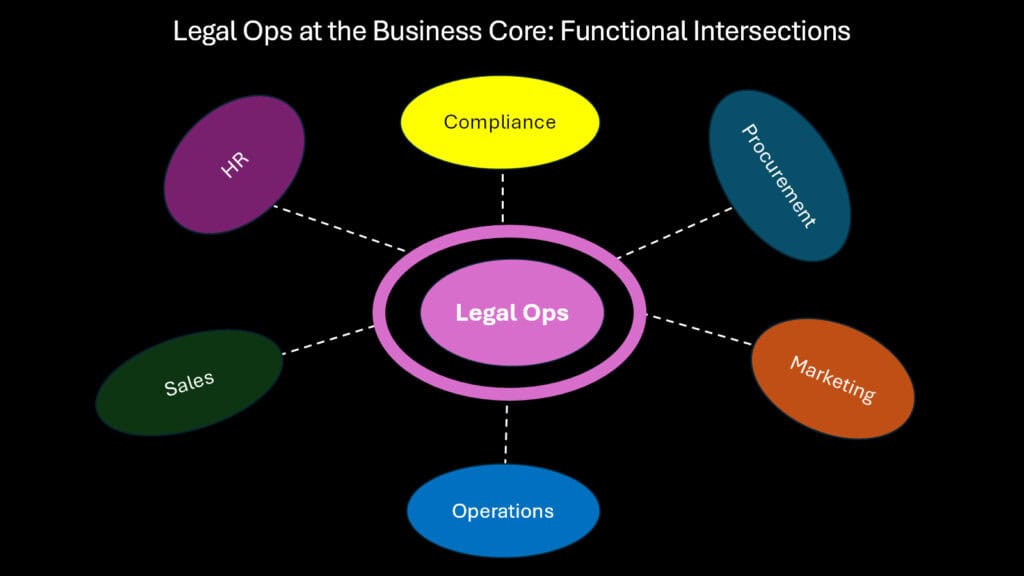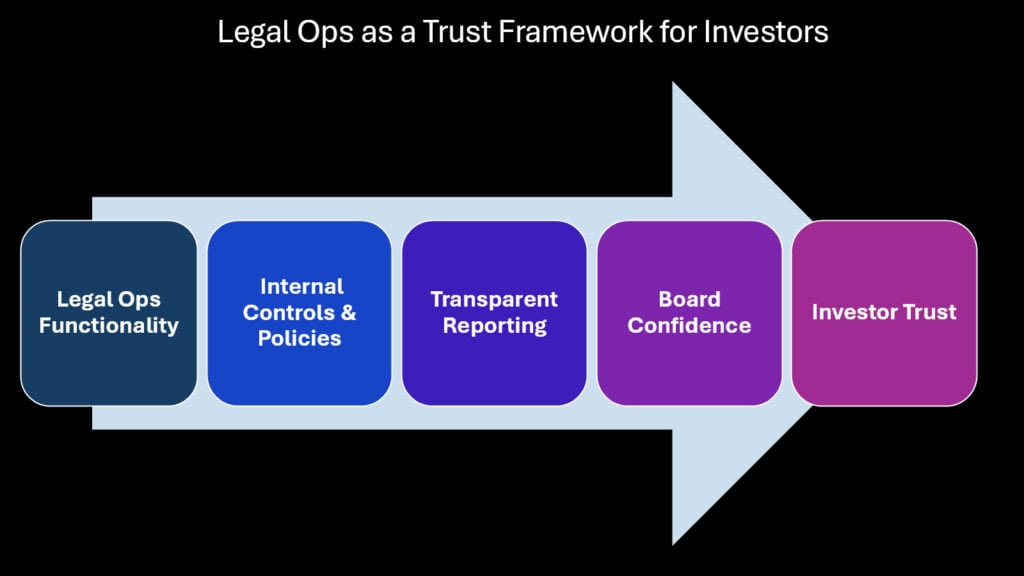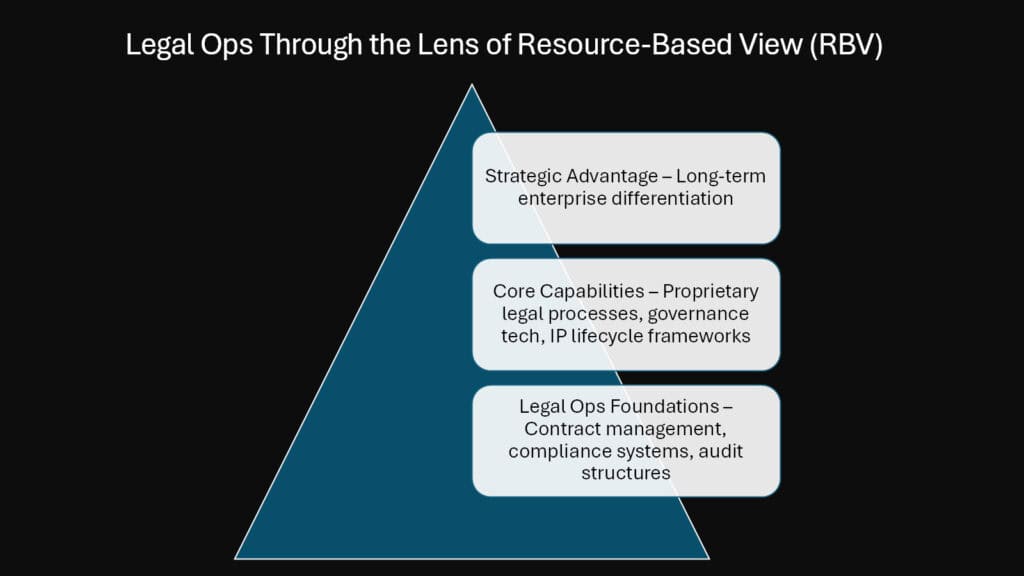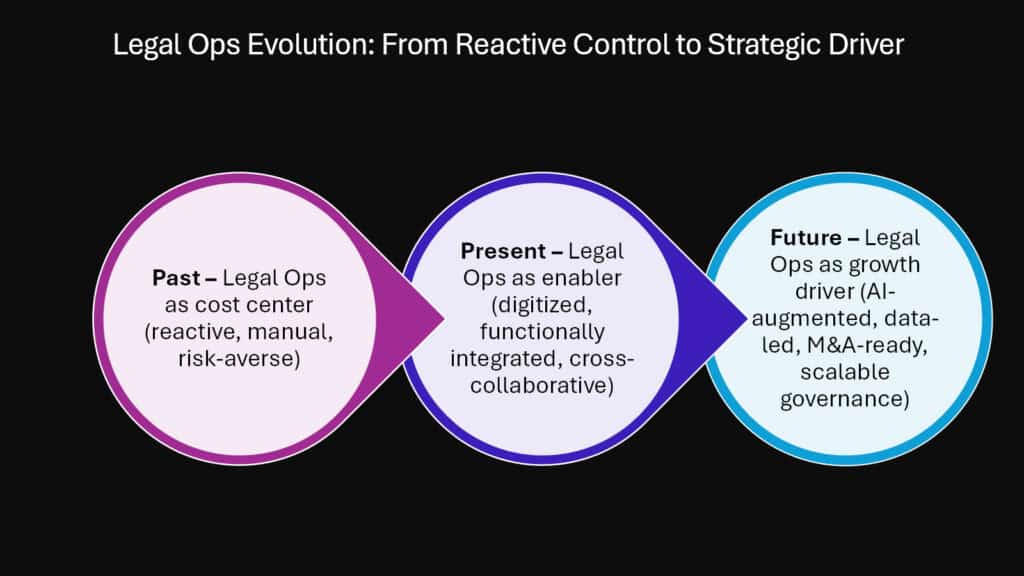Table of Contents
Introduction: Legal Ops and Business Value: The Invisible Growth Engine

Corporate boardrooms today witness an interesting paradox. While executives debate revenue growth and market expansion, one crucial function operates quietly in the background, weaving legal integrity into every business decision. This function is Legal Operations, or Legal Ops, and it represents perhaps the most undervalued driver of enterprise value in modern organizations.
Legal Ops has evolved far beyond traditional legal support functions. Rather than serving as a reactive compliance checkpoint, it has become a proactive business enabler that manages contracts, intellectual property, regulatory compliance, and governance frameworks. Modern Legal Operations teams integrate seamlessly with core business functions including human resources, sales, procurement, and marketing departments. They create the legal infrastructure that allows businesses to move with confidence and clarity.
The transformation of Legal Ops reflects broader changes in how companies approach risk and opportunity. Budget scrutiny has intensified, with the Association of Corporate Counsel reporting that 42% of Chief Legal Officers had to reduce costs last year. This pressure has pushed Legal Operations to demonstrate measurable value rather than simply managing legal processes. The result is a function that actively contributes to revenue generation, cost optimization, and strategic decision-making.
Today’s Legal Ops professionals operate at the intersection of law, technology, and business strategy. They build systems that enable faster deal closure, reduce regulatory risk, and create competitive advantages through superior legal infrastructure. This evolution positions Legal Operations as less about paperwork and more about creating enterprise clarity, continuity, and confidence.
The following six areas demonstrate how Legal Ops drives measurable enterprise value: value chain integration, investor confidence enhancement, strategic expansion enablement, cross-functional collaboration, competitive advantage creation, and artificial intelligence integration. Each area represents a distinct pathway through which Legal Operations transforms from a cost center into a growth engine.
Table 1: Legal Operations Integration Across Enterprise Functions
| Business Function | Legal Operations Role | Enterprise Value Impact |
|---|---|---|
| Procurement | Vendor contract optimization | Cost reduction and risk mitigation |
| Human Resources | Employment law compliance | Talent retention and regulatory safety |
| Sales | Contract acceleration | Revenue velocity improvement |
| Marketing | Intellectual property protection | Brand value preservation |
| Finance | Regulatory reporting | Stakeholder confidence enhancement |
| Operations | Process compliance | Operational efficiency gains |
1. Legal Ops and Value Chains: From Contracts to Capital
Legal Ops delivers measurable value by integrating legal integrity into business operations across all enterprise functions. This integration transforms legal requirements from friction points into value creation opportunities. Companies that master this integration gain significant competitive advantages through superior operational efficiency and reduced risk exposure.
Porter’s Value Chain framework provides the perfect lens for understanding how Legal Ops creates enterprise value. The value chain divides company activities into primary activities like procurement, operations, and sales, alongside support activities including technology and human resources. Legal Operations operates across both categories, ensuring legal compliance while enabling business velocity.
In procurement, Legal Ops teams develop standardized vendor agreements that reduce negotiation time while maintaining risk protection. These templates allow procurement teams to move faster while ensuring consistent legal standards. The time savings translate directly into cost reductions and improved vendor relationships. Companies report contract cycle time reductions of up to 60% when Legal Operations implements effective template libraries and approval workflows.
The operations function benefits from Legal Ops through compliance automation and risk monitoring systems. These systems identify potential legal issues before they become costly problems. For example, automated compliance tracking helps manufacturing companies maintain environmental regulations while optimizing production processes. The result is operational continuity without regulatory interruption.
Sales organizations gain tremendous value from Legal Ops through contract acceleration and deal structure optimization. Legal Operations teams create playbooks that help sales professionals navigate complex contract terms without extensive legal review. This reduces deal cycle time and improves close rates. Advanced Legal Operations functions even provide competitive intelligence through contract analysis, helping sales teams understand market positioning and pricing strategies.
Marketing departments rely on Legal Ops for intellectual property protection and advertising compliance. Legal Operations ensures marketing campaigns comply with regulatory requirements while protecting brand assets. This protection preserves brand value and prevents costly legal disputes. Companies with strong Legal Operations functions report fewer trademark conflicts and faster product launch timelines.
Table 2: Porter’s Value Chain – Legal Operations Integration Points
| Value Chain Activity | Legal Operations Contribution | Business Impact |
|---|---|---|
| Inbound Logistics | Supplier contract standardization | Reduced vendor onboarding time |
| Operations | Compliance automation | Operational risk reduction |
| Outbound Logistics | Distribution agreement optimization | Market expansion facilitation |
| Marketing & Sales | IP protection and contract acceleration | Revenue velocity improvement |
| Service | Customer agreement management | Relationship continuity |
2. Legal Ops Strengthens Investor Confidence and Corporate Governance

Legal Ops serves as a cornerstone of corporate governance by building transparent, auditable systems that demonstrate ethical accountability and regulatory compliance. This transparency directly impacts investor confidence and enterprise valuation. Companies with robust Legal Operations functions consistently receive higher governance ratings and attract more favorable investment terms.
Modern investors scrutinize corporate governance more intensely than ever before. Environmental, social, and governance (ESG) criteria now influence investment decisions across all asset classes. Legal Ops creates the infrastructure that enables companies to meet these elevated standards. Through systematic compliance monitoring, audit trail creation, and policy enforcement, Legal Operations builds the foundation for sustainable business practices.
The audit trail capability of Legal Ops provides tremendous value during due diligence processes. Whether companies are raising capital, pursuing acquisitions, or preparing for public offerings, comprehensive legal documentation accelerates transaction timelines. Investors can quickly verify compliance history, understand risk exposure, and evaluate management effectiveness. This clarity lowers transaction expenses and enhances the reliability of agreements.
Board oversight becomes more effective when Legal Ops provides clear visibility into legal risks and compliance status. Regular reporting on contract performance, regulatory changes, and legal metrics helps board members make informed decisions. This visibility is particularly valuable in regulated industries where compliance failures can result in significant penalties or operational restrictions.
Legal Ops also enables proactive risk management through early warning systems and trend analysis. By monitoring contract performance, regulatory changes, and industry developments, Legal Operations can identify potential issues before they impact business operations. This foresight allows companies to adjust strategies, modify processes, or strengthen controls before problems emerge.
The compliance infrastructure created by Legal Ops extends beyond regulatory requirements to include industry standards and best practices. This thorough approach illustrates the management’s dedication to ethical business practices. Companies with strong Legal Operations functions report fewer regulatory violations, lower insurance costs, and improved stakeholder relationships.
Table 3: Legal Operations Governance Impact Areas
| Governance Area | Legal Operations Function | Investor Benefit |
|---|---|---|
| Risk Management | Compliance monitoring | Reduced investment risk |
| Audit Readiness | Documentation systems | Faster due diligence |
| Board Reporting | Legal metrics dashboard | Improved oversight |
| Regulatory Compliance | Automated tracking | Reduced penalty risk |
| Ethical Standards | Policy enforcement | ESG compliance |
| Transaction Support | Due diligence preparation | Deal velocity improvement |
3. Legal Ops and Strategic Expansion: A Risk-Aware Enabler
Legal Ops unlocks global growth opportunities by systematically mitigating cross-border legal complexity and regulatory variance. Companies expanding into new markets face intricate legal landscapes that can derail expansion plans or create unexpected liabilities. Legal Operations creates the frameworks and processes that enable confident expansion while maintaining compliance across multiple jurisdictions.
PESTEL analysis provides a structured approach to understanding how Legal Ops navigates expansion challenges. Political factors include government stability, trade policies, and regulatory frameworks. Economic factors encompass currency regulations, tax structures, and economic policies. Social factors involve cultural norms and business practices. Technological factors include data protection requirements and digital commerce regulations. Environmental factors cover sustainability requirements and environmental regulations. Legal factors encompass contract law, employment regulations, and intellectual property protection.
Legal Ops addresses political risks through comprehensive regulatory mapping and government relations strategies. When companies enter new markets, Legal Operations teams research political stability, regulatory trends, and government priorities. This analysis helps companies understand the political environment and adapt their expansion strategies accordingly. For example, companies entering emerging markets often face uncertain regulatory environments that require flexible legal structures and adaptive compliance strategies.
Economic factors require Legal Ops to understand currency regulations, tax implications, and economic policies that affect business operations. Legal Operations teams work with finance and tax professionals to structure international operations in ways that optimize tax efficiency while maintaining legal compliance. This coordination is particularly important for companies operating in multiple jurisdictions with different tax treaties and regulatory requirements.
Social and cultural factors influence contract structures, employment practices, and business relationships. Legal Ops teams research local business customs, negotiation styles, and relationship expectations. This cultural intelligence helps companies avoid misunderstandings and build stronger local partnerships. For example, companies expanding into Asian markets often need to adapt their contract structures to accommodate different business relationship expectations and negotiation processes.
Technological factors have become increasingly important as companies rely on digital infrastructure and data analytics. Legal Ops ensures compliance with data protection regulations like GDPR in Europe, CCPA in California, and similar frameworks in other jurisdictions. This compliance is essential for companies that rely on customer data or digital services for their business models.
Table 4: PESTEL Analysis – Legal Operations Expansion Framework
| PESTEL Factor | Legal Operations Strategy | Business Enablement |
|---|---|---|
| Political | Regulatory mapping | Government relations |
| Economic | Tax optimization | Cost structure efficiency |
| Social | Cultural adaptation | Local partnership success |
| Technological | Data compliance | Digital service delivery |
| Environmental | Sustainability compliance | ESG requirements |
| Legal | Multi-jurisdiction frameworks | Risk mitigation |
4. Legal Ops Bridges Functions: The Silent Collaborator in Business Performance
Legal Ops functions as the organizational glue that connects diverse business functions through consistent policies, shared risk understanding, and collaborative problem-solving. This integration creates enterprise-wide alignment that accelerates growth while maintaining compliance standards. Companies with effective Legal Operations report improved cross-functional collaboration and faster decision-making processes.
The integration between Legal Ops and human resources creates powerful synergies in talent management and organizational development. Legal Operations provides HR with employment law expertise, contract templates, and compliance frameworks that enable efficient hiring and employee management. This support is particularly valuable in global organizations where employment laws vary significantly across jurisdictions. Legal Operations helps HR navigate complex immigration requirements, labor regulations, and employment contract standards.
Sales organizations benefit from Legal Ops through contract acceleration and deal structure optimization. Legal Operations creates playbooks that help sales professionals understand contract terms, negotiate effectively, and close deals faster. These playbooks include pre-approved contract language, escalation procedures, and competitive intelligence gathered from contract analysis. Sales teams report increased confidence in contract negotiations and improved deal velocity when supported by effective Legal Operations functions.
Finance departments rely on Legal Ops for regulatory reporting, contract analysis, and risk assessment. Legal Operations helps finance teams understand the financial implications of legal agreements, regulatory changes, and compliance requirements. This comprehension is essential for precise financial planning and risk management. For example, Legal Operations can identify contract clauses that create future financial obligations or liabilities that must be reflected in financial statements.
Marketing departments work with Legal Ops to ensure advertising compliance, protect intellectual property, and manage brand assets. Legal Operations provides marketing teams with guidelines for promotional campaigns, social media activities, and content creation. This guidance helps marketing teams avoid regulatory violations while maximizing creative freedom. Legal Ops also manages trademark portfolios, copyright protection, and brand enforcement activities that preserve marketing investments.
Operations teams benefit from Legal Ops through process compliance and risk mitigation. Legal Ops creates standard operating procedures that ensure legal compliance while maintaining operational efficiency. These procedures are particularly important in regulated industries where operational errors can result in significant penalties or safety risks. Legal Operations also helps operations teams understand insurance requirements, vendor obligations, and regulatory reporting responsibilities.
Table 5: Cross-Functional Legal Ops Collaboration
| Business Function | Collaboration Area | Performance Impact |
|---|---|---|
| Human Resources | Employment law compliance | Talent acquisition efficiency |
| Sales | Contract acceleration | Deal velocity improvement |
| Finance | Regulatory reporting | Financial accuracy |
| Marketing | IP protection | Brand value preservation |
| Operations | Process compliance | Operational risk reduction |
| IT | Data governance | Technology risk management |
5. Legal Ops and Competitive Advantage: A Strategic Asset, Not a Cost Center

Legal Ops creates sustainable competitive advantages through superior legal infrastructure, proprietary knowledge systems, and strategic process optimization. Companies that view Legal Ops as a strategic asset rather than a cost center gain significant advantages in market positioning, risk management, and operational efficiency. This strategic perspective transforms Legal Operations from a support function into a value creation engine.
The Resource-Based View (RBV) of competitive advantage provides a framework for understanding how Legal Ops creates sustainable value. RBV posits that competitive advantages arise from resources that are valuable, rare, inimitable, and non-substitutable. Legal Operations creates these resources through contract intelligence systems, compliance protocols, and legal process optimization that competitors cannot easily replicate.
Contract intelligence represents one of the most valuable resources created by Legal Ops. Advanced Legal Operations functions develop sophisticated contract databases that provide competitive intelligence, market insights, and negotiation advantages. These systems analyze contract terms, pricing structures, and performance metrics to identify market trends and optimization opportunities. Companies with superior contract intelligence can negotiate better terms, identify new opportunities, and avoid market pitfalls.
Compliance protocols create another source of competitive advantage through operational efficiency and risk mitigation. Legal Ops develops standardized procedures that ensure consistent compliance while minimizing operational burden. These protocols are particularly valuable in regulated industries where compliance complexity can create significant competitive barriers. Companies with superior compliance systems can enter new markets faster, launch products quicker, and operate with greater confidence.
Legal process optimization provides competitive advantages through cost reduction and speed improvement. Legal Ops identifies inefficiencies in legal processes and implements solutions that reduce costs while improving quality. These improvements compound over time, creating significant competitive advantages. For example, companies that can process contracts 50% faster than competitors can close deals quicker and respond to market opportunities more effectively.
The intellectual property management capabilities of Legal Ops create long-term competitive advantages through innovation, protection, and brand building. Legal Operations develops patent strategies, trademark portfolios, and trade secret protection programs that preserve competitive advantages. These assets become increasingly valuable as companies grow and expand into new markets.
Legal Ops also creates competitive advantages through vendor relationship management and strategic partnerships. By managing legal relationships with key suppliers, distributors, and partners, Legal Operations helps companies build stronger business relationships and negotiate better terms. These relationships often become strategic assets that are difficult for competitors to replicate.
Table 6: Resource-Based View – Legal Ops Competitive Resources
| Resource Type | Legal Operations Asset | Competitive Advantage |
|---|---|---|
| Valuable | Contract intelligence | Market insights and negotiation power |
| Rare | Proprietary compliance systems | Operational efficiency |
| Inimitable | Legal process optimization | Cost and speed advantages |
| Non-substitutable | IP management expertise | Innovation protection |
| Organizational | Legal relationship networks | Strategic partnership value |
| Knowledge | Legal precedent databases | Decision-making superiority |
6. Legal Ops in the AI Era: Intelligence, Not Just Automation
Artificial intelligence is reshaping Legal Ops from a process-focused function into a strategic intelligence capability that guides enterprise decision-making. Rather than replacing Legal Ops professionals, AI amplifies their strategic impact by automating routine tasks and providing analytical insights that were previously impossible. This transformation positions Legal Operations as a digital legal brain that enhances business intelligence across the organization.
AI helps lawyers quickly produce initial drafts of motions, legal briefs, contracts, and settlement agreements, which in the past have been time intensive. This automation frees Legal Ops professionals to focus on higher-value activities like strategic analysis, relationship building, and business advisory services. The time savings from AI automation can be reinvested in activities that directly contribute to business growth and competitive advantage.
AI is used in contract management to help ensure compliance, analyze contract data for insights, and automate drafting, review cycles, and approval processes. Smart contract systems can analyze thousands of agreements to identify patterns, risks, and opportunities that would be impossible to detect through manual review. This analytical capability provides business leaders with insights into market trends, competitive positioning, and operational risks.
Predictive compliance represents another frontier where AI enhances Legal Ops capabilities. AI capabilities include automated document reviews and tracking of regulatory changes, which ensures that organizations are always up to date with evolving compliance requirements. These systems can predict regulatory changes, identify compliance gaps, and recommend proactive actions that prevent violations before they occur.
The document review capabilities of AI transform Legal Ops from a reactive function into a proactive advisor. AI platforms can review hundreds of contracts in seconds and automatically redraft with compliant clauses. This capability allows Legal Operations to provide real-time guidance to business teams while maintaining comprehensive oversight of legal commitments.
AI-powered analytics also enable Legal Ops to demonstrate measurable business value through data-driven insights. By analyzing contract performance, compliance metrics, and legal costs, AI systems can identify optimization opportunities and quantify the impact of Legal Operations initiatives. This analytical capability is crucial for securing executive support and expanding Legal Ops investment.
Legal ops leaders note whether AI will be used for automation or augmentation, with automation involving AI completely taking over manual tasks, while augmentation uses AI to assist and enhance human work. The most successful Legal Operations functions balance automation and augmentation to maximize both efficiency and strategic impact.
Table 7: AI Integration in Legal Ops Functions
| AI Application | Legal Operations Function | Strategic Impact |
|---|---|---|
| Contract Analytics | Pattern recognition | Market intelligence |
| Compliance Monitoring | Regulatory tracking | Proactive risk management |
| Document Review | Automated analysis | Quality and speed improvement |
| Predictive Modeling | Risk assessment | Strategic planning enhancement |
| Process Automation | Workflow optimization | Cost reduction |
| Decision Support | Data-driven insights | Executive advisory capability |
Conclusion: Legal Ops and the Enterprise Future: From Guardrails to Growth Drivers

Legal Ops has evolved from a traditional support function into a strategic capability that drives enterprise value across multiple dimensions. The six areas explored in this analysis demonstrate how Legal Ops creates measurable business impact through value chain integration, governance enhancement, expansion enablement, cross-functional collaboration, competitive advantage creation, and artificial intelligence integration.
The transformation of Legal Ops reflects broader changes in how businesses approach risk, compliance, and strategic planning. Companies that recognize Legal Ops as a strategic asset gain significant advantages in operational efficiency, risk management, and competitive positioning. These advantages compound over time, creating sustainable competitive differentiation that is difficult for competitors to replicate.
The integration of artificial intelligence amplifies the strategic impact of Legal Ops by automating routine tasks and providing analytical insights that guide business decision-making. This technological enhancement positions Legal Ops as a digital legal brain that enhances business intelligence across the organization. Companies that successfully integrate AI into their Legal Ops functions will gain significant advantages in speed, accuracy, and strategic insight.
Future-ready organizations are already positioning Legal Ops as a proactive strategic lever rather than a reactive compliance function. This positioning enables Legal Ops to contribute directly to merger and acquisition activities, innovation initiatives, and valuation enhancement. The legal infrastructure created by effective Legal Ops functions becomes a strategic asset that supports business growth and competitive advantage.
The investment in Legal Ops capabilities generates returns through cost reduction, risk mitigation, and revenue acceleration. Companies that view Legal Ops as a cost center miss significant opportunities for value creation. The most successful organizations treat Legal Ops as a strategic investment that generates measurable returns through improved business performance.
Looking forward, Legal Ops will continue evolving as business complexity increases and regulatory requirements expand. Companies that build strong Legal Ops capabilities today will be better positioned to navigate future challenges and capitalize on emerging opportunities. The legal infrastructure created by effective Legal Ops becomes a foundation for sustainable business growth and competitive advantage.
Table 8: Future-Ready Legal Ops Capabilities
| Capability Area | Current State | Future Evolution |
|---|---|---|
| Risk Management | Reactive compliance | Predictive risk modeling |
| Contract Intelligence | Manual analysis | AI-powered insights |
| Global Expansion | Jurisdiction mapping | Automated compliance |
| Cross-functional Integration | Siloed support | Strategic partnership |
| Technology Integration | Process automation | Decision augmentation |
| Value Measurement | Cost tracking | ROI optimization |




